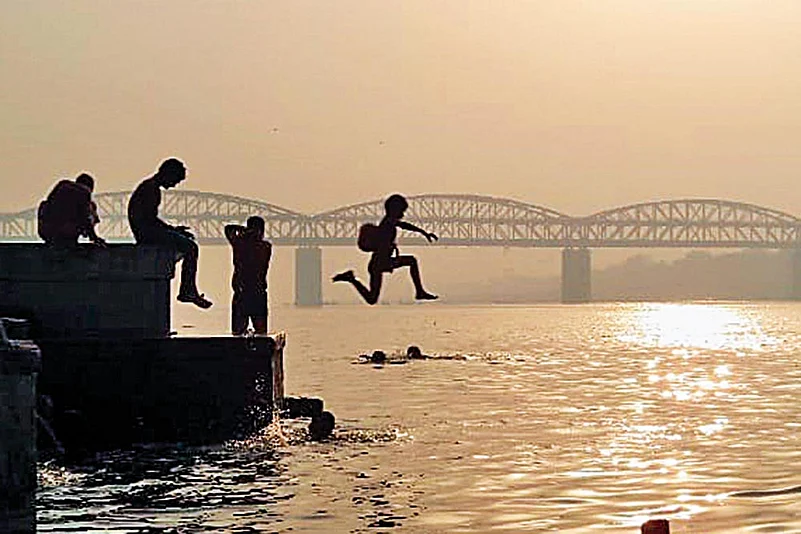Benares Diary: Of Ghats And Lanes And Changing Times
Once you immerse in these sights and smells and finally surrender, then the gully shows you things

As I write this, a boy jumps headlong into the tepid waters of the Ganga. I first came here in 2008 and have been coming here since, almost every year, walking along the squalid lanes, crumbling havelis and the river. Every year I have come to this place, a major change had already happened in my life. I have seen life, love and death, maybe that is why I show up here. I am staying in a hotel where they used to entertain a lot of celebrities, notably Rani Mukherji and Konkona Sen Sharma.
Left and Right Lanes
The lanes of Benares, if you approach the left ones, facing Dashashwamedha Ghat, are very different from the right ones. The Vishwanath temple and its new arch nemesis, the Gyanvapi mosque, colour the atmosphere of the left ones. You are likely to find more dung here. South Indians of all denominations (read Hindu) as well as Bengalis throng these lanes. Both clueless, clued-in and glued-out whites abound in both lanes. The left lanes wind down to guest houses which have superb views of the river and horrible service. You pay to see the river and live the miserable existence of having come to and loving Benares. Once you immerse in these sights and smells and finally surrender, then the gully shows you things. The moon resplendent through a mesh of rusty wires, a faint thumri lifting your weary cause, and a steaming cup of tea. You sit down at the ghats, take the first sip and let your heart out to the river. Its depth capable of taking in your entire life’s sorrow and futilities.
The right side is where all the fun is. Israelis, Koreans, Chinese, Japanese and a smattering of Europeans and Americans roam the right streets. Any café would offer you Bibimbap, Katsu curry, pancakes, questionably real coffee and other non-Indian staples. If you are a regular like me, you can sit in a Korean café and clandestinely sip beer from a cappuccino cup or a beer comes to you wrapped in a paper bag called thunna. The right side of the Dashashwamedha Ghat is where all the ‘left’, questionably liberal things happen.
I have a Bihari friend there, who has been running a café which serves all kinds of good stuff (contraband included, if you ask nicely) lamented this time about the lack of development of Varanasi. I thought he would wax eloquent about heritage preservation and what not. He meant that there should be more demolitions in order to make the ghats more visible from the main roads.
Over the last two years, many gullies have opened up to construction sites. You turn a corner and suddenly among the debris you see three temples which you don’t recognise. You realise they were always there but they had always blended with other secular corners and balustrades of the same old gullies. One can only hope that these (de)constructions slow down, if not completely stop.
Changes Galore
Every time I come to Benares, its peripheries expand into malls and its evening aartis turn more performative. Penitence and divinity-starved faces, both white and brown, sit swaying on the boats and look at the priests lifting huge lamps as if their machinations would stop humans from doing what they are meant to do. I do not watch the aarti anymore. I avoid the staged din and prefer the normal din of Godhulia, with its scammers selling two hundred rupee Benaresi sarees.
All the ghats have multi-coloured neon lights now, which light up the ghats like they are actually on LSD. Apart from making the ghats safe, they also make Johnson, the 70-year-old Spanish hippie happy. He told me he can rest in peace now, when all of Benares (he claimed to have never left the ghat and its surroundings for the last 40 years) seems to be tripping after the sun goes down. He is only unsure whether he will find his last resting place, in Manikarnika or Raja Harishchandra. Earlier one could be sure, now, no more.
The boy is drying himself now on the ghat. He seems to be the happiest person in the world. But this is Benares, for all you know, his daily life moves around picking up unburnt bits of flesh from the pyres, if he is lucky, then at the Manikarnika Ghat, if not, from Raja Harishchandra Ghat where Dalits and all the unwanted bodies of this country are cremated. The Ganga takes it all in, except, she maintains that there are some steps which are more equal than others.
This appeared in the print as 'Benares Diary'
Anirban Ghosh is director, Centre for Writing, Shiv Nadar Institute of Eminence



















